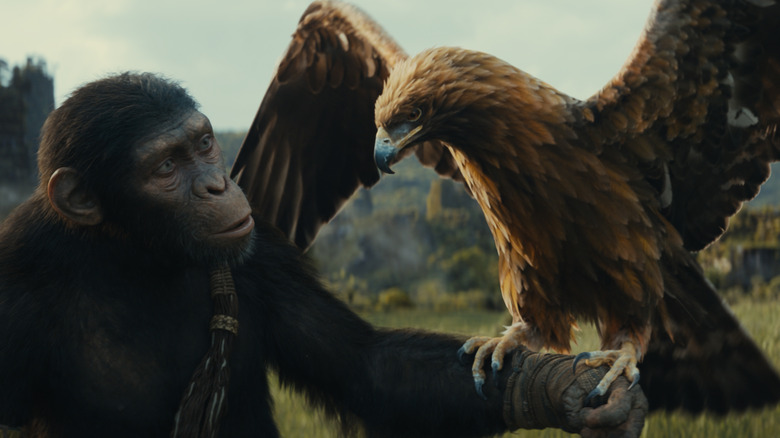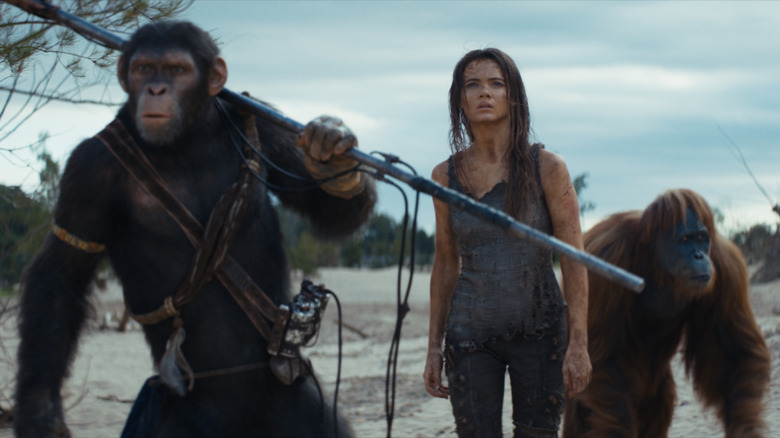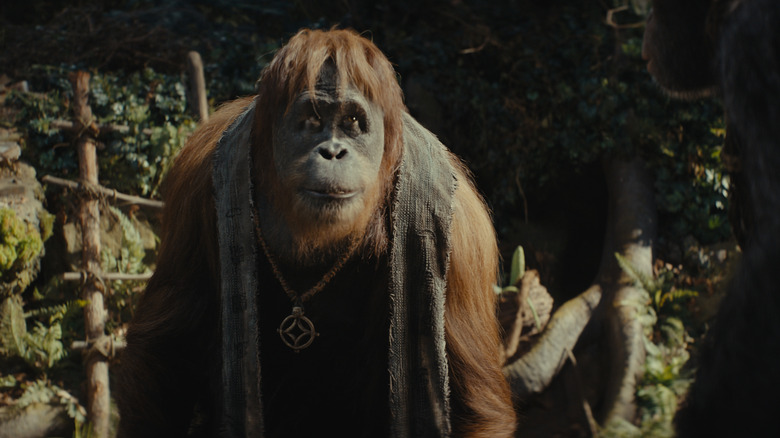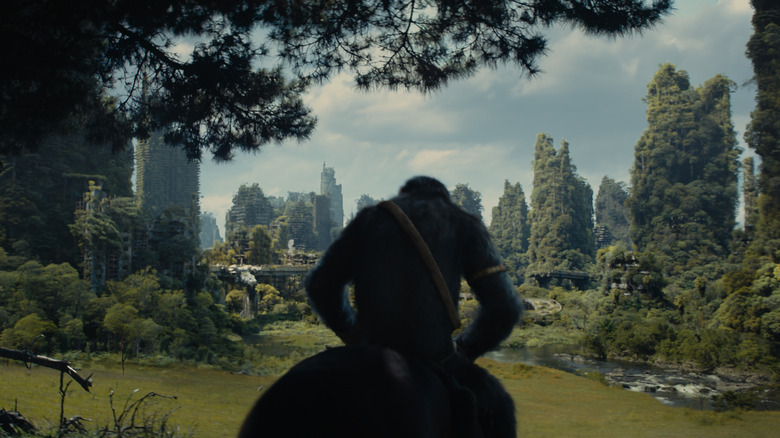Kingdom Of The Planet Of The Apes Review: The Best Of The New Apes Series
Franklin J. Schaffner's 1968 sci-fi classic "Planet of the Apes" introduces its titular primates in a gloriously nightmarish fashion. The film's central astronaut trio, lost on a distant planet (wink), finds panicked, mute humans running through a field of tall grass, fleeing attackers on horseback. The camera then zooms dizzily into the face of one of said attackers, revealing that he is, in fact, a gorilla. This world, we see, is topsy-turvy. It is a place where humans and apes are transposed, with the former treated like animals by the latter. Schaffner, and screenwriters Michael Wilson and Rod Serling, present this tilted universe as a conduit for satire, a means to dissect and examine the foibles of humanity via the absurd — even whimsical — image of talking ape men. The film may end on a bleak note, but there's some levity mixed into the very batter.
In contrast, the recent wave of "Apes" retreads — active since 2011 — excised every last shred of whimsy in favor of self-serious tragedy. The films are about dour, brutal wartime violence (especially in the case of 2017's "War for the Planet of the Apes"), and turgid, po-faced worldbuilding. The fall of humankind, the rebooted series argues, will be a slow, painful process; humans will cling to Earth by their fingernails, even after it's quite clear that the natural world is picking us out of its fur like so many unappetizing chiggers. How odd that "Planet of the Apes" should be transformed into something so nihilistic.
Thank goodness, then, for Wes Ball's "Kingdom of the Planet of the Apes," handily the best of the new Apes series. It is a film that fast-forwards deep into the post-ape world, takes a few deep breaths, and lets us live there for a moment.
The best of the new Apes series
Too many of the extant ten "Planet of the Apes" movies to date concern themselves with how the title planet came into being. The 1968 original kept audiences off-balance by keeping the origins of the Ape world a mystery until its final, penetrating shot. And even then, the details of the Ape apocalypse weren't important. By 1972's "Conquest of the Planet of the Apes," however, filmmakers were actively dramatizing the Ape uprising and the inevitable fall of humankind. 1973's "Battle for the Planet of the Apes" extended that dramatization, and the 2011, 2014, and 2017 films all plunged wrist-deep into the origin story; they cut themselves on a sharp, rusty tin-can edge infected with prequelitis.
"Kingdom of the Planet of the Apes" takes place after the Rise and the Dawn, skipping ahead "many generations" after the death of Caesar (Andy Serkis), the hyper-intelligent chimpanzee from the previous movies. In this film, nature has repossessed the world, reducing recognizable human structures to vine-encrusted rubble; we see the Theme Building at LAX coated with moss. Eagles nest in rusted scaffolding and ape communities have built their own rudimentary high-rises out of abandoned radio towers. It is a lush, verdant world of simian peacefulness, and director Ball allows his ape characters to slowly traverse it, taking in the cracking of overhead branches and the whistle of the clean nighttime winds. This is as natural a world as modern CGI can provide.
Trekking through this world is Noa (Owen Teague), an ape teen on a quest to rescue his kidnapped ape village from a religious zealot named Proxima Caesar (Kevin Durand). His journey is a classic picaresque, providing our ape hero with a textured, pointed adventure ... as well as an unexpected faith journey.
Faith on the Planet of the Apes
Noa lives in bliss in his ape village, and an opening sequence sees him and two friends — Soona (Lydia Peckham) and Anaya (Travis Jeffrey) — hunting for eagle eggs in remote places. Noa's ape village is known for raising and training eagles to gather fish. The harmonic ideal is interrupted by a pair of interlopers, however. The first is a human woman (Freya Allan) who attempts to pilfer food. The second is a brutal army of cattle-prod-wielding ruffians who attack the village and kidnap its denizens. Noa eludes capture, reconnoiters the following morning, and sets off on his rescue quest.
Along the way, he befriends a spiritual old orangutan sage named Raka (Peter Macon), and Noa learns all about Caesar, and his two vital rules: that ape shant harm ape, and that "Apes Together Strong." Enough time has passed that Caesar has already become a distant, largely forgotten myth, a Messianic figure that most apes have lost faith in. Importantly, Caesar's message of unity has already become misinterpreted as a call for dominance, a rallying cry for Proxima who only seeks to add apes to his enslaved workforce. Apes Together Strong, but some apes are more together than others.
Noa and Raka also befriend the above-glimpsed itinerant human woman who, we shall soon learn, has a complex backstory of her own. Director Ball might have assumed a human audience would instantly sympathize with a human character, but I didn't trust her for a second. Indeed, she seems so untrustworthy, and the film's final moments — where a few additional twists are presented — feel bleaker than Ball might have intended. Is the fate of humanity worth a sequel tease, or can't we simply let homo sapiens go gentle into that good night?
The Planet of the Apes reboot series excels most in is its special effects
The reboot series excels most in is its special effects. The apes, realized through elaborate motion capture, look as real as any CGI creation ever has, especially in the case of 2014's "Dawn of the Planet of the Apes." It also helped that expressive actors like Andy Serkis and Toby Kebbel provided the ape movements. With "Kingdom," the techniques have advanced enough that just about any actor can slip into the motion capture suit and have their nuanced performances captured in every detail; the "smoothness" usually associated with CGI characters is largely absent.
The ape actors also have affected a unique, simplified way of speaking, speaking their ape sentences in a halting fashion, as if they only discovered language a few centuries before. The ape language takes on a character all its own, making one feel that Ball did his sci-fi homework; at the very least, he can present a sci-fi world with an eye on the "long arm" of time. This is the Planet of the Apes now. We can finally act like it.
Previously, Ball has only directed three "Maze Runner" films, each of the artifacts from the '00s and '10s Y.A. dystopian trend. The "Maze Runner" movies were based on a nonsensical conceit — teens are memory-wiped and then locked into a moving maze populated by monsters (??) — and Ball, for whatever slick effects and sexy young actors who could throw in, couldn't quite salvage the material. Here, Ball seems more assured, letting his $165 million franchise picture contain scenes of walking, of rest, and of quiet. After a decade of hyperactive action and nerdy mythos construction, the quiet moments are appreciated.
/Film Rating 8 out of 10



